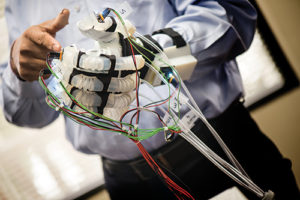What happens when a bot acts not only as an assistant but a key team member?
Almost half of all existing jobs may be replaced by automation within the next 20 years, according to a study by researchers at Oxford University. How will humans interact with their bot counterparts? Which functions are best performed by artificial intelligence versus humans?
These are the questions being explored by George Siemens, executive director of the University of Texas at Arlington’s (UTA) Learning Innovation and Networked Knowledge (LINK) Research Lab.
Siemens and other researchers at UTA are working with a grant from Boeing to help the company understand future learning environments where new technologies such as bots, robots and artificial intelligence are active participants in teams, alongside workers.

“A lot of companies are facing a challenge to reskill their employees for an environment where they need to collaborate with technology, not just use it,” says Siemens. “This information will be important to all organizations.”
Smart bots like Amazon’s Alexa or Apple’s Siri are already being incorporated into social environments as both a resource and support in the daily lives of millions of people.
Siemens sees artificial intelligence working hand in hand with human customer service.
“You may find that in some areas a customer would much rather have an automated process and another area that may want a human process,” he says. “So, how do you intelligently make those decisions, as a corporate entity?”
Siemens says his research is fueled, in part, by data generated by students who work with UTA’s free online course offerings on its platform edX.
As artificial intelligence improves, these bots are expected to be working with employees in integrated teams, with the bots able to act not only as assistants but as key team members, providing analysis and input.
“It will be like human-plus, a resource with more capacity than only humans working as part of the team,” Siemens says. ”Whole new skill sets will be needed for employees.” Siemens and his team are developing a series of papers and reports for Boeing on how new knowledge and learning technologies are being developed and deployed at both universities and corporations.
This article is part of the 2020 Higher Education Review Magazine.